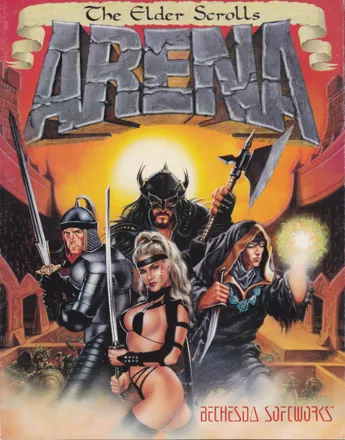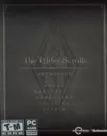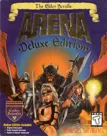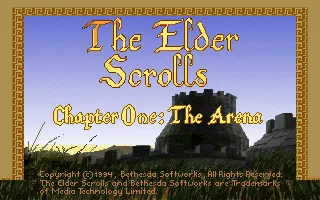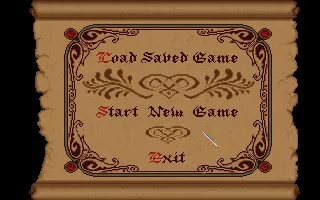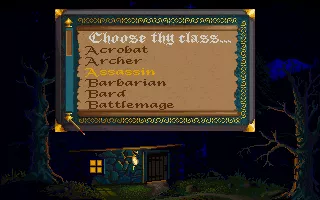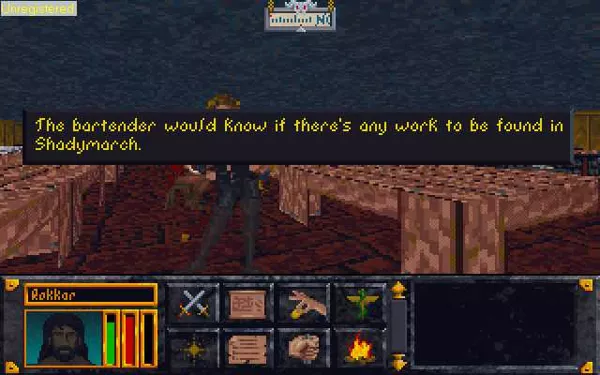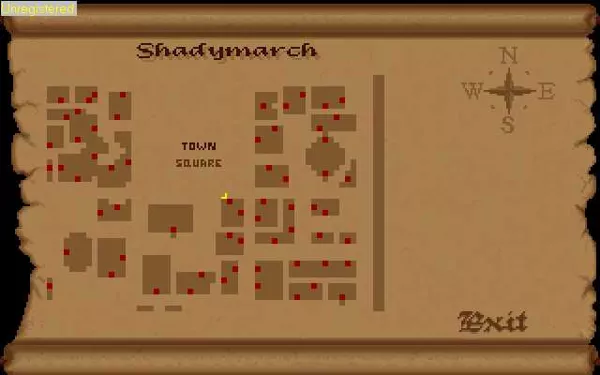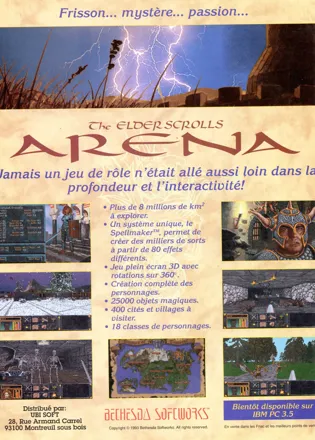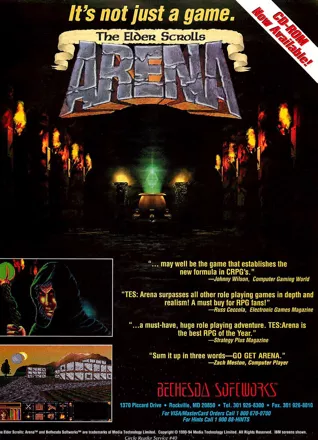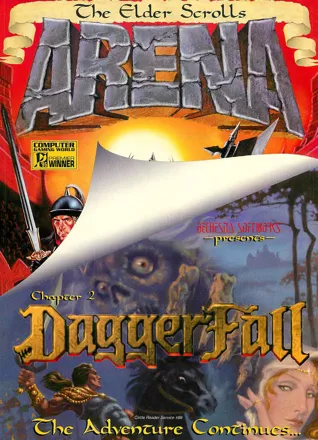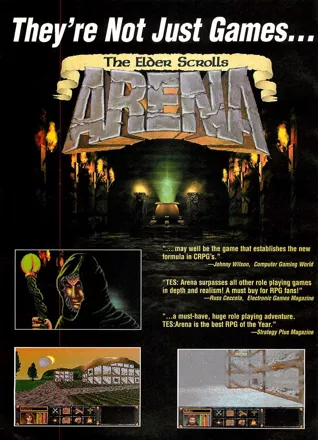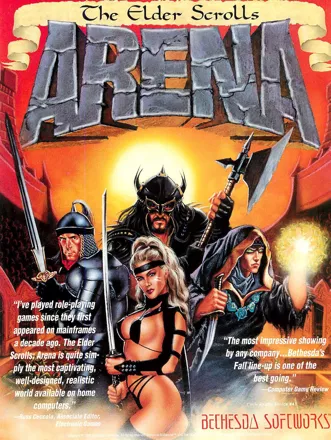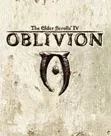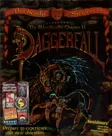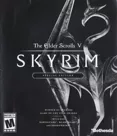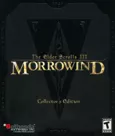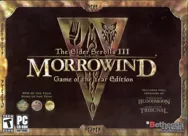The Elder Scrolls: Arena
Description official descriptions
The Elder Scrolls: Arena is a first-person action role-playing game in which the protagonist must rescue the Emperor Uriel Septim VII from his dimensional prison by recovering the eight pieces of the Staff of Chaos. The emperor's position has been usurped by impersonator Jagar Tharn, whose slain apprentice rallies the protagonist in his dreams to find the eight pieces of the staff and return the status quo.
It is the first chapter in the Elder Scrolls series and the first game that is set in the fictional world of Tamriel. The game features 3D environments, with sprites representing non-playable characters and enemies. In the beginning of the game the player chooses the race for the protagonist, based on his or her home province. Each race has its benefits: for example, Redguards from the province Hammerfell have physical attack bonuses. There is no skill system; leveling up occurs after a sufficient amount of experience points has been accumulated. The player is free to raise any of the protagonist's main attributes by allocating the points gained with the level.
Unlike later games in the series the player can travel through almost all of Tamriel, instead of being restricted to certain provinces. There are over 400 cities, towns and villages to explore, as well as many magical items and spells to create. The player can walk endlessly in any direction as more and more land will be procedurally generated. Walking manually however never allows the player to reach other cities; the fast travel feature must be used for this. The player is free to go where he or she wants. The story itself is resolved in a linear fashion, although the locations of items is randomly determined at the start of the game.
Melee combat is performed through mouse gestures and spells are cast using a menu interface. The player controls only a single character, which happens in real-time. In the wild and in dungeons the player can expect opposition from enemies which need to be defeated and who drop loot. In the cities NPCs can be found, some will barter or provide other services to the player.
The CD-ROM release features speech in cutscenes and additional rendered sequences that the floppy version does not include.
Groups +
- Animals: Cats
- Covermount: PC Action
- Elder Scrolls series
- Fantasy creatures: Elves
- Fantasy creatures: Goblins
- Fantasy creatures: Minotaurs
- Fantasy creatures: Orcs
- Fantasy creatures: Trolls
- Gameplay feature: Auto-mapping
- Gameplay feature: Character development - Skill distribution
- Gameplay feature: Journal
- Gameplay feature: Paper doll inventory
- Games with manual lookup copy protection
- Protagonist: Female (option)
- Sound engine: AIL/Miles Sound System
Screenshots
Promos
Credits (DOS version)
17 People · View all
| Lead Design | |
| Design | |
| Lead Programming | |
| Programming | |
| Additional Programming | |
| Graphics / Artwork | |
| Additional Graphics / Artwork | |
| Music | |
| Documentation | |
| Executive Producer | |
| Producer | |
| Director | |
| Playtesting | |
| Quality Assurance | |
| [ full credits ] | |
Reviews
Critics
Average score: 77% (based on 24 ratings)
Players
Average score: 3.6 out of 5 (based on 60 ratings with 7 reviews)
Simpily one of the best games ever.
The Good
The Elder Scrolls Arena, is the first game in the Elder Scrolls series, and it is very good. With 8 races, and 18 classes, you have a bit to chose from. It's non-linear, very, if you want to kill a elf, walkng in town fine, if you want to break into a noble house and rob it fine, if you want to be a noble knight and kill those scumbag, fine. The fighing system is good, simple, you click and drag mouse. Theres over 400 places to visit, and the wilderness, is real fun to travel, on your way you'll find, people, temples, houses, wayside inns, and crypts and that sort of stuff. It's big. Also the holidays, which make thing cheaper, free. Then the mighty spell maker, you can make powerfull spells.
The Bad
Bugs. The most annoying one is, when you save your game, the game frezzes, and you lose you save game, making save alot, with servel, games, and that can get confusing. But it's pertty rare.
The Bottom Line
If your a rpg fan, and see this game, buy it.
DOS · by Blackhandjr (89) · 2000
The exotic world of damp and cold weather
The Good
Look, I can't really remember EVERY SINGLE DETAIL about a a game I played some 5-6 years ago. But I played this game to the end - which is something I can't say about Wizardry 7, any Might and Magic game or the follow-up to this same offering, Daggerfall. I'm just not a very fanatic role-playing game fan so the fact that I finished this game says something. And what in particular that something might be I'll try to list here:
-
The role-playing elements don't get in the way of enjoying the game. I didn't know what "stats" were before I played this game, and I didn't know it after I finished it either.
-
Combat was fun and almost Wolf3d like in terms of speed in which you hack through enemies. It wasn't too hard and it wasn't too easy.
-
Getting cool items was very cool indeed. Everything in this game could be bought and sold, and half the enjoyment of the game was in this process. It's more like SimMedievalWanderingMerchant with 8 or so dungeons thrown on just so you could get your exotic items somewhere. After that, it's a matter of walking through a dozen or so different towns with mostly exquisitely NON-exotic weather (snow, damp, rain - it feels like home), finding various merchants and haggling with them as you try to get the biggest price for your violently-acquired wares and try to find that elusive Deal of the Century (plate for chain prices, Orb of Killeverybody for a mere 4 Stones of Swamp-creature-B-gone, your own super-duper-sword which you just sold the guy yesterday for 200 now being sold for 1200).
-
Buy this game. Get out of the initial dungeon. Look at the sky. TWO moons, was it? Or three? I don't remember exactly, but it was beautiful. And the game has lots of stuff like that - atmospheric stuff, swamps, rained-down cities at night with bandits lurking behind the corner, beautiful snowing dawns as you watch the rising triple-suns or whatever. Don't ask me for details but it was beautiful. And in a way that has nothing to do with that scantily-clad chick on the cover.
- Unlike a certain follow-up, it was quite straight-forward and basic. 8 big dungeons, each with one item you need. Get them, kill baddies, done. And no bleeding impossible to navigate 3-d dungeons with horrific impossible to understand 3-d maps either.
The Bad
I don't really remember. There was no real plot. There was little if any NPC interaction. It was all quite basic and basically all about wandering either through depressing dungeons or rather desolate countryside with bandits roaming about or some cities where no-one wants to talk to you except the merchants who only want to rob you of your hard-earned cash. Wait, I meant to put "bandits" there.
Ah well. At least it didn't ra- er, at least I wasn't hit by any lightning.
The Bottom Line
There's really no reason not to play this game. It has no real in-your-face drawbacks, and has lots of quiet charms hidden inside. And it has a memorable unique feel about it - I like to think of it as the depressing, damp side of Ultima 7, only without the plot and the npc interaction. And unlike the (thunder and lightning, little creatures run in terror) follow-up, it's over before you begin to feel the inclination to take the CD to the forest and burn it and bury the ashes in some crossroads.
DOS · by Alex Man (31) · 2002
The Good
After Ultima series defined the Western RPG quality standard rather early in its history, it influenced subsequent development of the genre in a somewhat odd way. The series' continuously growing preference for tight scripting (which culminated in Serpent Isle) paved the way to the RPG revival of the late 1990's, heralded by Black Isle and BioWare. On the other hand, the early, Ultima V-style template prescribed non-linear advancement, full free-roaming, and focus on exploration and gradual immersion into the game world rather than following an exciting story with interesting characters.
Elder Scrolls games by Bethesda are heirs to the second approach to RPG-making, but also to the groundbreaking Ultima Underworld games with their first-person real 3D navigation and action-based combat. So these games have the vast world and open areas of "regular" old Ultimas plus the immersive quality and atmospherics delivered by the engine used in the spin-offs. Arena is the first in the series, and while many people grew more familiar with its better-known sequels, it cannot be denied that Arena already contained in a nutshell many of the defining elements of the series' gameplay.
First things first: Arena is huge. It has an absolutely gigantic 3D world that surpasses by far anything that was created for role-playing games before it. The amount of towns, dungeons, and other places of interest is positively overwhelming. You get dizzy after emerging from the initial dungeon and realizing you can travel anywhere, at any time, on the enormous continent of Tamriel. The absolute freedom to do whatever you want is what makes Arena so addictive and awe-inspiring. Never before was there a RPG world of such size, offering such unlimited exploration possibilities. It is no wonder this feature became the cornerstone of the future series.
Now, it's true that much of this world is randomized, and some people tend to dismiss Arena because of that. But the game cleverly conceals its randomness by offering varied terrain, weather effects, and climatic changes influenced by times of the year. You can travel from Elsweyr to Morrowind and witness the first snow there. You can leave the city gate and travel in the darkness and snowfall, find a cozy abandoned house, rest in it, and be greeted by the clear morning. Graphically on par with contemporary first-person shooters, Arena manages to create a beautiful world that is in constant motion, calling you back even after you get tired from the repetitive textures.
Even though NPCs are random as well, there are many dialogue templates that are surprisingly well-written and often quite amusing. You can always hear different responses in every tavern; you can bargain with shop owners and repeatedly talk to jesters and listen to their stupid jokes. People have different names and occupations and also refer to the protagonist's race during conversations. Nice text descriptions greet you whenever you enter specific buildings. Naturally, after having been doing this for a while you'll see how everything repeats itself. But still, there is a big difference between an enormous randomized world and a small one; the possibility to physically move in every direction at any time in a seamless 3D environment is simply exhilarating, no matter how many recurrent elements you encounter on your way.
The role-playing system in Arena is simple: you create your character, fight enemies, gain experience and level up. Were Arena just a dungeon crawler, this simplicity would have made it boring; but the necessity to explore and travel in order to encounter tougher enemies and obtain better gear is what makes the whole process so addictive. You never know where you may find some great armor or a particularly challenging beastie to defeat. There are hundreds of cities and dungeons; each city has several shops, and each dungeon has foes lurking in the darkness. You choose your own adventure in all this vastness; you decide where you want to shop, how exactly you outfit your character, what you specialize in, and so on. The game never dictates you the pace; you choose it on your own. You can perform quests, search for treasure, bargain and trade, go on a killing spree, hunt for monsters, steal valuable items, or just walk through the countryside. It's this free-form role-playing that makes Arena uniquely entertaining.
The main quest may be very simplistic, but if you follow it you'll encounter the game's only planned, hand-made dungeons, assignments, and items. There are also some interesting riddles you'll have to solve along the way. Outside of the main quest, there are plenty of missions offered by country rulers to undertake, as well as the artifact quests, which hold some of the game's most powerful weapons, armor, and accessories.
The Bad
The obvious flaws of Arena owe their existence to the severe technical limitations of its time. 3D gaming was still in a rudimentary state, and the only way to create immense 3D environments was by using the same elements over and over again. To the game's credit, I must stress that there are many such elements - certainly enough to create a considerably large game world in which every single NPC, object, terrain style and building would be unique. That is why I can't help thinking that perhaps it would have been more reasonable to reduce the size of the world somewhat and minimize the randomness.
I don't particularly like the idea of endless countryside. You can walk for hours and never reach another town; terrain, lone buildings, wandering NPCs and enemies will be procedurally generated as you advance, never coming to an end. Again, I'd prefer exploring a world that would be less jaw-droppingly gigantic, but coherent in its structure. In the end, much of the exploration in Arena is reduced to bringing forth the world map and clicking on a location of interest.
You can travel to any Tamriel province in the game, but towns will still look the same. There are certain racial diversity among the inhabitants and differences in landscape and climate, but I didn't notice any variation in the architecture. Imperial City, for example, is the same collection of blocky, bland buildings as the most decrepit village at the outskirts of High Rock. If you have visited one tavern, you have visited them all; all weapon and armor shops in Tamriel are managed by identical twins; the same types of NPCs, graphically and personality-wise, appear everywhere. The game generously presents you with an incredibly large world to explore, but doesn't fully encourage you to do that. You can safely base yourself in any of the provinces, never leave it, and you will have seen pretty much everything the game has to offer. You'll only have to travel all over this world because the main quest requires you to do so.
Speaking of which, the main quest's premise is certainly not worse than in any other fantasy RPG, but the extremely formulaic structure makes it somewhat tiresome and repetitive. You'll always follow the same scheme: listen to rumors, detect the next province of interest, locate the next questgiver there, complete a mission for him or her, and learn the location of a dungeon containing the staff piece. Also, the riddles you'll need to answer to get the crucial items, while entertaining, cannot be bypassed; if you can't figure out the answer to any of them, you'll be stuck, unable to find any other way to continue the main quest.
Fans of Elder Scrolls games got used to the rich lore of their world, presented in detail in long conversations and well-written books. Unfortunately, there seem to be no books in Arena, and the conversations are brief and rarely concern any cultural topics. As a result, the world of Arena lacks depth and intellectual appeal, becoming a rather generic, simplified fantasy environment with recycled themes.
The Bottom Line
Notwithstanding its limitations and shortcomings, Arena amazes with its sheer ambition. Its accomplishment as the first fully free-roaming 3D RPG cannot be overlooked. Ahead of its time, Arena contributed and paved the way to the genre's subsequent development, and still remains a surprisingly enjoyable game today.
DOS · by Unicorn Lynx (181780) · 2011
Discussion
| Subject | By | Date |
|---|---|---|
| Skill system in Arena? | MrFlibble (18166) | Jul 21, 2013 |
| Release date on main summary | Izmir Egal (73) | Jul 29, 2012 |
| Term of development. | Virgil (8563) | Nov 1, 2007 |
Trivia
Development
Arena was at first, not going to be a RPG, but instead a gladiator style game. Someone came up with the RPG idea, and it caught.
Freeware release
To coincide with the 10th anniversary of the Elder Scrolls series in 2004, Bethesda Softworks released the first game, Arena, as freeware. It can be downloaded from the Elder Scrolls website
Inspiration
The Elder Scrolls: Arena was primarily inspired by a collection of pen and paper RPGs, the Ultima Underworld series, and the first-person RPG Legends of Valour.
Translations
A German version of the game was announced and the box distributed in Germany even included a sticker and post card offering to exchange the game for the German version once available. However no localized versions were ever released. One reason may have been that the game's program code is using fixed text lengths, making it very difficult to find equal length translations for other languages.
Awards
- Computer Gaming World
- May 1995 (Issue #130) – Role-Playing Game of the Year
Analytics
Upgrade to MobyPro to view research rankings!
Related Sites +
-
Official Elder Scrolls Website
Bethesda Softworks official site for the Elder Scrolls series. -
Unofficial Elder Scrolls Pages!
A wiki page that is dedicated to the Elder Scrolls series. It a great source for hints and backround information concerning the Elder Scrolls saga. Just about everything can be found here.
Identifiers +
Contribute
Are you familiar with this game? Help document and preserve this entry in video game history! If your contribution is approved, you will earn points and be credited as a contributor.
Contributors to this Entry
Game added by faceless.
Windows Apps added by Plok. Windows added by Rik Hideto.
Additional contributors: Blackhandjr, Isak, Iggi, SGruber, Patrick Bregger.
Game added January 27, 2000. Last modified March 15, 2024.
